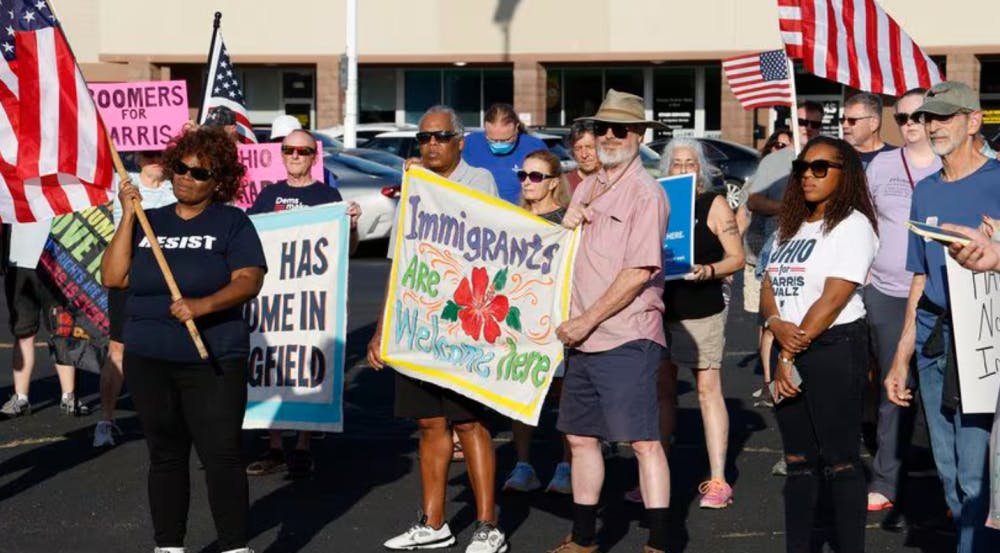Trump's return to office has brought a wave of strict immigration policies, leading to mass deportations and heightened enforcement measures. As immigration enforcement intensifies, communities across the nation, including designated Welcoming Cities like Dayton, grapple with the consequences of these sweeping changes.
Trump’s actions towards deportation
As of Feb. 5, only 16 days following Trump’s return to the presidential office, over 8,000 migrants have been arrested. The immigration crackdown, which was stressed throughout Trump’s 2024 campaign season, has been enacted in efforts to reduce national security risks and public safety.
Trump’s first week consisted of signing many executive orders focusing on mass deportation of illegal immigrants and ordering ICE raids. Many have expressed surprise in the strictness and mass numbers of arrests, but the initiative is one which was promised from President Trump.
“He’s doing exactly what he promised he would do, which is ship people out of the country,” Edward Fitzgerald, political science professor at Wright State University, said.
The signed executive orders highlight Trump’s reasoning for strict arrests.
“Many of these aliens unlawfully within the United States present significant threats to national security and public safety, committing vile and heinous acts against innocent Americans. Others are engaged in hostile activities, including espionage, economic espionage, and preparations for terror-related activities,” an executive order from President Trump said.

Immigration has been an issue brought up in many presidencies that present opposing viewpoints from both parties. The republican party has expressed support for Trump’s approach to dealing with immigration through mass deportations. Democratic opinions on immigration are more lenient, with past democratic leaders taking steps to arrest illegal immigrants that committed crimes while in the U.S.
Since Trump’s actions towards immigration following office takeover, ICE raids have become a frequent occurrence, with less restrictions than in the past.
“The first directive rescinds the Biden Administration’s guidelines for Immigration and Customs Enforcement (ICE) and Customs and Border Protection (CBP) enforcement actions that thwart law enforcement in or near so-called “sensitive” areas,” a Homeland Security statement from Jan. 21 reads. Trump’s authorization of ICE raids to occur in sensitive areas allows for arrests to be conducted in areas such as schools, hospitals and places of worship.
The rising number of daily arrests have appeased the political goals of many, while raising concerns for others.
Potential deportation issues
Daily arrests of illegal immigrants with little background research on individuals has brought public outcry from a portion of the population. Several worry about ICE’s ability to arrest migrants and about the future of these migrants in terms of safety.
The mass deportations have brought issues between the U.S. and other countries who refuse to take back deportees or do not have the space to hold these individuals.
Deportation disputes have led to strained relationships, which has sparked a tariff war on goods coming to the U.S. from countries like Mexico and Canada. The proposed 25 percent tariffs on U.S.’s neighbors has currently been postponed by Trump for a month, but this leaves many weary of the economic effects if these tariffs get enacted, according to The Associated Press.
The mass deportation initiative, beginning on Jan. 20, has consisted of costly plane rides to transport migrants. These flights are estimated to cost anywhere between $816,000 and $852,000.
Deportation of illegal immigrants also leaves individuals questioning what will happen with the jobs migrants will be leaving behind.
“A lot of these undocumented people are working in industries like hospitality, construction, etc. And so if those industries are adversely affected because they can’t hire people to do the work, and then other people then have to find an inconvenience in their life about it, that might cause a bit of a backslide,” Fitzgerald said.
The effects of immigration of deportees and U.S. citizens is currently uncertain, as Trump plans to continue mass arrests.
Deportation’s effect on the local community
Dayton, Ohio, was announced as the first Certified Welcoming Community in the U.S. and has been a certified Welcoming City since 2017, making it one of 24 in the U.S.
The title was given to the Gem City by nonprofit Welcoming America, an organization that gives designations to cities which promote values of immigrant inclusion and diversity. The nonprofit organization has recognized the current safety threats posed to the immigrant communities and made sure to continue encouraging the organization’s values.

“Together, in partnership with communities, we are writing a different story—one where neighbors come together, diversity is celebrated as an asset, and inclusion is at the heart of all we do,” a statement from Welcoming American said.
The Dayton immigrant population is one that has continued to rise over several years, a fact that the city takes pride in. Trump’s initiatives and statements made towards immigrants throughout the leader's political career have presented undocumented migrants as individuals to fear.
The perspective can create issues of usefulness for even documented immigrants, as it opens the door for discrimination.
For those worried about the safety of immigrants, Welcoming America has provided information on how to continue to help communities with immigrants thrive and feel welcomed. The nonprofit encourages donating to relevant charities, speaking out by contacting representatives and staying up to date with news.












